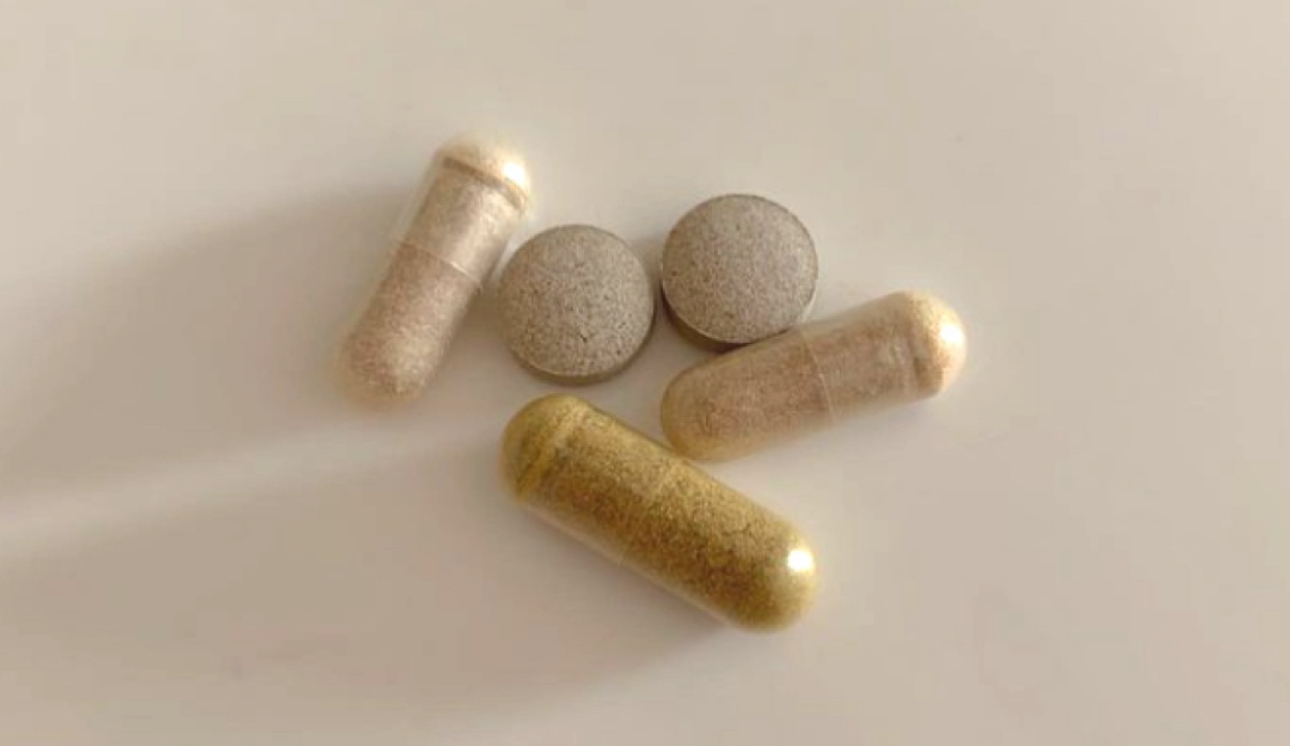The Best Supplements to Support Your Menopause Journey
What works (and what doesn’t), according to Dr. Jenn Huber

Entering menopause, we can feel a shift on many fronts—physical, emotional, and mental. As our hormone levels fluctuate and eventually decline, many of us experience symptoms such as hot flashes, brain fog, and difficulty sleeping. These changes can impact us on many levels, including bone density, heart health, and overall well-being.
Enter supplements: a potential ally in managing these shifts and maintaining health. But with so many options, it’s essential to understand which supplements can be truly beneficial in this stage of life and how they fit into an overall wellness plan along with a balanced diet.
“With the exception of maybe vitamin D, I would say there aren’t any must-take supplements for people in menopause,” says Dr. Jenn Huber, a registered dietician, intuitive eating counselor, and naturopathic doctor specializing in helping clients navigate menopause. “But I think that they can play an important role in helping people to meet not only their basic dietary needs but also helping to manage the symptoms of menopause when chosen correctly.”
Dr. Huber, whose podcast, “The Midlife Feast,” tackles topics surrounding hormonal changes for women ages 40 and up, explains that supplements can be viewed through two lenses. “One, some supplements are meant to do exactly what they’re called: supplement our diet,” she says. “But then the other kind of lens is using them for a therapeutic reason, and that would be taking amounts that are higher than what we could realistically ever get from food for a specific effect.”
The Main Players
Omega-3s
Found in seafood, nuts, seeds, and plant oils, omega-3 fatty acids play a crucial role in our bodies. In addition to potential benefits for heart health, such as reducing triglycerides and improving cholesterol levels, they can also help with mood regulation, potentially alleviating symptoms of depression and anxiety, which some women experience during menopause.
Omega-3s are also known for their anti-inflammatory properties, so people who are experiencing joint pain or muscle pain — a very common symptom in perimenopause and menopause — might find relief through supplements, says Dr. Huber.
Furthermore, omega-3s have been linked to improved cognitive function, helping to combat the infamous “brain fog” that often accompanies menopause. “Fifty percent of our brain is made up of these omega fats,” she explains.
While there are no official guidelines outlining how much EPA or DHA (the most easily absorbed forms of omega-3s) adults should consume every day, the American Heart Association recommends taking in the range of 3g daily in food or supplement form to potentially lower blood pressure.
Magnesium
Magnesium is an important mineral for the human body, involved in more than 300 of its chemical reactions. While lots of people take magnesium to alleviate menopausal symptoms, including mood swings and irritability, “the research actually isn’t as strong as you would expect it to be, based on how much love people have for it,” says Dr. Huber, who incorporates it into her own supplement regimen. “Lots of people find that taking magnesium helps with sleep and relaxation, but the amounts that you usually would need to take are maybe a little bit harder to get through food alone. It’s possible but a bit more challenging,” she says. Dietary sources for magnesium include legumes, nuts, seeds, whole grains, fish, and meat. Important to note: there are several different types of magnesium, but the ones most commonly associated with sleep and relaxation are citrate and glycinate.
The recommended daily allowance for women ages 31 and up is 320 mg per day from both food and supplement sources, but as with all supplements, consult with a healthcare provider to determine appropriate levels for your individual needs.
Calcium
Research conducted over the last ten years suggests that calcium may not be as successful in preventing bone fractures as it was once thought, says Dr. Huber. Nevertheless, it plays an important role in slowing down bone loss and reducing the risk of osteoporosis when combined with vitamin D, which enables the body to absorb calcium. “Our bones are like a bank; every time our body needs calcium, it takes a withdrawal from that vein. And if we’re not replenishing it, then we’re going to end up in a negative balance; we’re working more withdrawals than deposits,” she says.
It’s possible to meet calcium needs through food, says Dr. Huber, who advocates prioritizing a balanced diet. Sources of calcium range from dairy products to dark green leafy vegetables, nuts and seeds, and fortified foods such as breads and cereals. “I would say that the evidence tends to be more in favor of a food-based approach to calcium than a supplement approach to calcium. But if people can’t, or don’t want to get it through food, a calcium supplement can be helpful,” she adds.
The recommended daily calcium intake for women ages 19-50 is 1,000 mg; for women ages 51 and up, it increases to 1,200 mg.
Vitamin D
Vitamin D is a pillar in menopausal health. In addition to contributing to immune function and mood regulation, vitamin D also affects muscle health. Some studies suggest adequate vitamin D levels may reduce the risk of chronic diseases such as heart disease and certain cancers. When estrogen levels drop during menopause, the risk of osteoporosis increases significantly, making vitamin D supplementation particularly important for maintaining bone density and reducing the risk of fractures.
Since many people, especially those in northern latitudes, struggle to get enough vitamin D from sunlight and food alone, a daily supplement of at least 800 to 1,000 IUs is often recommended – even if you’re not menopausal. Dr. Huber suggests discussing this with your primary care provider, as well as asking whether you should be getting screened for vitamin D deficiencies.
A Healthy Gut Microbiome
Probiotics and prebiotics also play a crucial role in maintaining gut health, which can be disrupted during menopause. Instead of relying solely on supplements to maintain a healthy gut microbione, incorporating fermented foods like yogurt, kefir, sauerkraut, and kimchi can naturally boost gut flora. “It’s far more important to keep the bacteria that you have well-fed with lots of diversity, fiber, and plants,” says Dr. Huber.
A Piece of the Menopause Health Puzzle
“I want to help women thrive. And I also want them to save their money because you can’t buy a menopause fix in a bottle,” says Dr. Huber. When it comes to managing menopausal symptoms with food and supplements, a holistic approach that emphasizes a nutrient-rich diet and regular exercise, combined with a supplement regimen approved by your healthcare professional, is the best path forward. “Supplements are a piece of the puzzle, but probably not what’s going to save us from our hot flashes.”



